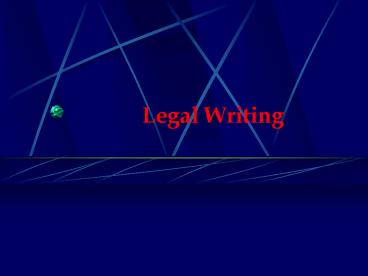Legal Writing - PowerPoint PPT Presentation
1 / 22
Title:
Legal Writing
Description:
In coursework you will be expressing your own ideas but also ... Prima Facie' Legal Dictionary 'Ibid (or 'Id') at...' 'Supra at...' 'Infra at...' Citing Books ... – PowerPoint PPT presentation
Number of Views:348
Avg rating:3.0/5.0
Title: Legal Writing
1
Legal Writing
2
Presenting Legal Writing
- Coursework MUST be presented
- Word processed
- Spell Checked
- On time PENALTIES for LATE SUBMISSION
- Within WORD LIMIT MORE PENALTIES
- PROPER USE OF REFERENCES
3
Legal References
- In coursework you will be expressing your own
ideas but also relying on a wide range of sources
to - show you know the law and legal issues
- to back up your arguments
- You should refer to your sources
- In footnotes
- Using the formal system legal citations/references
4
What sort of information will I be relying on?
- Judgments Law Reports
- Statutes/EU legislation
- Basic Information in Student Textbooks
- More sophisticated legal arguments made in
Academic Monographs Articles published in Legal
Journals - References to other materials
5
Formal System of Legal Citation
- Consistent approach to citation - Follow a
citation Style Sheet - Accuracy of references
- Use of Footnotes/Endnotes ease of presentation
- Avoid plagiarism.
6
Citation of Journals
- Northern Ireland Legal Quarterly (NILQ)
- Modern Law Review (MLR)
- Law Quarterly Review (LQR)
- Public Law (PL)
- European Law Review (EL Rev)
- Common Market Law Review (CML Rev)
7
Latinisms
- Ratio of a case, things said in obiter..
- Res Ipsa Loquitor
- Prima Facie
- Legal Dictionary
- Ibid (or Id) at
- Supra at
- Infra at
8
Citing Books
- Author Name
- Title of Book
- Year of Publication
- Publisher
- Exact page reference(s)
- Sometimes an essay in a collection of essays
9
Consistency Style Sheet
- See handout NILQ Style Sheet
- See materials for sample of coursework submitted
by a student - Marks are deduced for poor presentation of
coursework.
10
Citing secondary sources the peril of plagiarism
AN ACADEMIC OFFENCE.
11
What is plagiarism?
- QUB Regulations.
- Plagiarism is defined as the presentation of the
work of others as the writers own without
appropriate acknowledgement.
12
This includes
- This includes auto-plagiarism (to use excerpts
from his or her previous work without appropriate
acknowledgment) and self-plagiarism (to submit
one piece of work more than once, e.g., where
such work has been previously submitted for a
different assignment) QUB Study Reg 7.17
13
Definition of plagiarism also includes situation
where.
- a student permits another student to copy
his/her work submitted for assessment. Both
parties will be dealt with in accordance with
university procedures QUB Study Reg 7.18 - On the universities procedures see QUB Study
Regs 7.24 ff
14
How serious an academic offence is plagiarism?
- Depends on whether the offence is minor or
major - An offence shall normally be designated as minor
if the piece of work where it occurs counts
towards one third or less of the assessment for
the module (Study Reg 7.2) - An offence shall be designated as major if the
piece of work where it occurs counts towards more
than one third of the assessment for the module
(Study Reg 7.3)
15
And the consequences?
- These range from
- a written warning to the student goes on your
transcript - to
- an award of a mark of zero for more than one
module being taken by the student at that time
and the refusal to allow the student to re-sit
those modules - to
- referral of the matter to the Committee of
Discipline if the decision is that an offence
merits a penalty more severe than those listed in
the Regs.
16
Rights of Appeal?
- See Study Regs 7.30-7.35
- 7.45-7.50
17
But I didnt mean it
- It is important to understand that intention
does not have a role to play in the definition of
plagiarism. - Not meaning to do it, or not knowing you are
doing it, is therefore not an excuse
18
Use your own words!
- In reading and grading your work we are
interested in YOUR understanding of an idea or
concept, not in your ability to copy explanations
from a book or article - Time pressure often leads to temptation to fall
into this trap.
19
We are experts in spotting plagiarism.
- Mixed citation styles
- Lack of references
- Lack of quotations
- Changes in style
- Unusual formatting font changes
- Being off topic
- Datedness of material
- Anomalies of style
- Computer software
20
If in doubt, ASK!
- Though plagiarism is a serious offence, if you
are clear, careful and honest there should be no
problem. - Learning how to make proper and responsible use
of other peoples work in developing your own
understanding of a subject is the heart of
academic life.
21
Further guidance (and sources)
- UK Centre for Legal Education,
- http//www.ukcle.ac.uk/resources/plagiarism/index.
html - JISC Plagiarism Advisory Service
- http//www.jiscpas.ac.uk/apppage.cgi?USERPAGE7510
22
Recent acquisition by School of Law







![download⚡[PDF]❤ Legal Writing for Legal Readers: Predictive Writing for First-Year Students (As PowerPoint PPT Presentation](https://s3.amazonaws.com/images.powershow.com/10066814.th0.jpg?_=20240627106)








![READ [PDF] A Short & Happy Guide to Legal Writing (Short & Happy Guides) PowerPoint PPT Presentation](https://s3.amazonaws.com/images.powershow.com/9915716.th0.jpg?_=20230803068)














